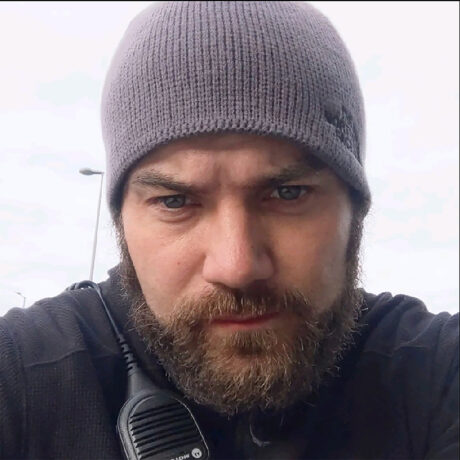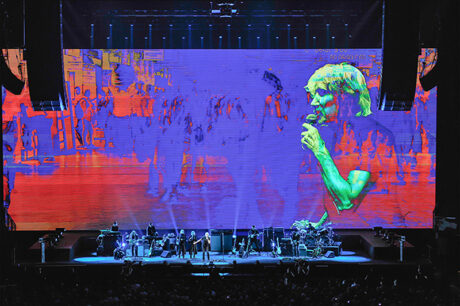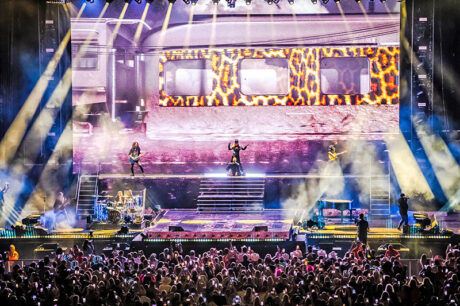
How did you end up in the concert touring industry?
My dad actually worked for Upstaging as a truck driver when I was growing up. So, I basically went out with him on a few tours, and then Jake Berry hired me as a carpenter when I was 16, 17. Bob the Builder was the first thing I did for him. Then I did a Rolling Stones tour for him. I then started working with Opie [PM Dale Skjerseth], and worked for him, 15 years or more as his head carpenter for the Stones and AC/DC. And then I did Roger Waters: The Wall with Chris Kansy, you know, just working things one after that. So, that’s how I got into things and went from there.
Were there moments or particular jobs you think really set you on your course in your career?
Being a head carp for Opie and Jake. You’re very involved in the whole thing. You are not just focused on your one aspect of what you do. You are expected to see the whole picture and understand what every other department’s trying to do at the same time. That is basically the beginnings of understanding production, seeing it past just your one lane; seeing the whole thing and how all the lanes come together. I think having been on the floor and building stages; facilitating in all the other departments, getting what they need and all that, I think it gives you a very balanced view of where everyone’s needs lie. And it gives you a broad view, it did for me. That experience gave me the understanding of a production that I then took and built on right up to today.

Is there one project experience that was unique or memorable, that stands out in your career and why?
I guess I would say Roger Waters: The Wall was probably the most unique thing I worked on. That was a giant theatrical production that we toured around the world, took to South America, all over Europe and in differing scales. We started off in arenas and then ended up in stadiums. Building a 650-foot-wide cardboard wall outdoors is definitely challenging. That was probably the most involved with an artist I think I’ve ever been before being a production manager. He’s very, very involved in everything in a really great way. He’s an incredible artist to work with and very clear on how he wants things, and he’s very personable with the crew. For The Wall, we were all in the trenches together making that thing happen, him included. And that was probably the proudest one I think of, of anything we pulled off.
What do you think might be some lasting changes to the role of production manager after the pandemic?
I wasn’t really a PM before the pandemic, but the biggest disruptions after Covid seem to all be subsiding now. Availability of gear for bigger things is definitely still a thing. It’s just so busy, it’s crazy. I’ve never struggled before to find people, carpenters, riggers, whatever the role is, available for work. Everyone is just slammed all the time, which is great for everyone, but it’s also challenging.
People having been at home for that two years, it definitely makes you look at what your priorities are and how much you actually do need to work. When it’s been 15, 20 years of constantly doing the same thing, you get this subconscious belief that you’ve just got to keep saying yes to everything and you’ve got to keep going out, keep busy and all that. And then the pandemic was just kind of like, “Oh, well maybe I don’t need to be hammering down quite so much.” There’s a whole life back here I want to be part of, so people are trying to do that. Which is understandable.

What do you enjoy most about your career?
Working with people that I’ve come up with over the last 20 years, basically. That’s one of the best things about doing production now, working with all these people that you worked alongside coming up from the beginning. You are basically touring with your friends. For me, that’s the best part of coming to work. Seeing all these people in their higher up roles now and just really flourishing. Seeing people realizing their potential and really doing the jobs. Also, having the opportunity to give other people that were right along there with you, the opportunities to step up. Our lighting crew chief on this [Shania Twain tour], Adam Cooper, hadn’t crew chiefed before, but I’ve worked with him for years and years on Ariana Grande, Green Day, and a few other things. I talked to Upstaging’s John Bahnick and was like, “Let’s give him the opportunity to step up.” And Adam’s been fantastic. That’s the rewarding stuff for me, to be in a position to just help people realize their potential.
Who are some of the people who have been key to your success, perhaps as mentors or advisors?
Opie and Jake Barry are two of the biggest. And Chris Kansy. I’ve worked with Opie for the longest, but I also worked with Chris for a good long stint with Roger Waters. And it was really Jake who got me in the door back in 2000 or so. Those three have been the ones who had the biggest impacts on me.
What has surprised you most about your career path?
I guess when I was a head carpenter, I always thought that the stage management thing required a little too much personal one-on-one skills that I tended to not see in myself… I’m kind of an introvert. And then when I did become a stage manager, it all just felt very natural to be in that role. So, I guess my career progress has all felt very like a natural evolution from tour to tour, though I never really originally planned it when I was carpenter. It has been a good path though; I look forward to continuing to what is next.


